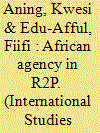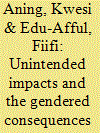|
|
|
Sort Order |
|
|
|
Items / Page
|
|
|
|
|
|
|
| Srl | Item |
| 1 |
ID:
145124


|
|
|
|
|
| Summary/Abstract |
Both the African Union (AU) and the Economic Community of West African States (ECOWAS) have been global leaders in embracing and operationalizing responsibility to protect (R2P). The adoption of the AU’s Constitutive Act, Article 4 (h) in 2000, has transformed its old-fashioned principle of noninterference to one of nonindifference. This authorizes the AU to intervene in Member States with respect to war crimes, genocide, ethnic cleansing, and crimes against humanity. ECOWAS has through its conflict prevention, management, and resolution protocol and its conflict prevention framework deepened and practicalized the notion of sovereignty as responsibility. These frameworks from both the AU and the ECOWAS have close similarities to the R2P norms. However, although these notions are captured in official documents, their actual operationalization faces challenges relating to sovereignty, limited institutional capacity, a restricted appetite for enforcement action, and a lack of explicit instruments to activate their intervention clauses in R2P-like situations. In spite of these challenges, the article argues that the initiatives of both the AU and the ECOWAS in Mali, Cote d’Ivoire, and Libya demonstrated a positively active African agency in contributing to global peace processes. This article, therefore, assesses the successes and limitations of African regional agency in enforcing R2P-like norms among its member states and its implications for and contributions to global international relations discourses.
|
|
|
|
|
|
|
|
|
|
|
|
|
|
|
|
| 2 |
ID:
119281


|
|
|
|
|
| Publication |
2013.
|
| Summary/Abstract |
Despite increased international attention to managing the potential impacts of peacekeeping on host countries, unintended consequences continue to emerge. This article focuses particularly on the alternative economies that peacekeeping operations generate and the differential economic impacts on individuals who come into contact with peacekeepers. Based on empirical evidence derived from fieldwork in Liberia, the article highlights the everyday lives of women whose livelihoods have been affected by the presence of peacekeeping missions. It also discusses how such economies adjust during the peacekeeping drawdown phase, and explores the dynamics that such economies have on specific segments of the Liberian population. The argument is that, while peacekeeping economies are critical in stimulating the local economy and providing livelihoods during and in the immediate aftermath of war, they have negative unintended impacts that need mitigation.
|
|
|
|
|
|
|
|
|
|
|
|
|
|
|
|
|
|
|
|
|